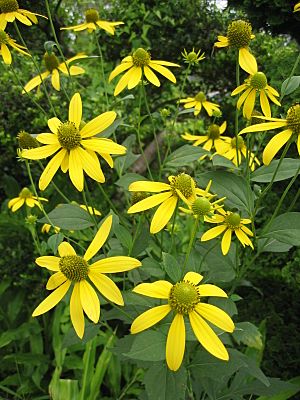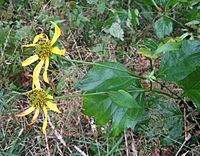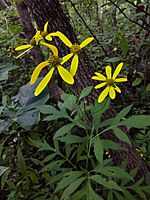Cutleaf coneflower facts for kids
Quick facts for kids Rudbeckia laciniata |
|
|---|---|
 |
|
| Scientific classification | |
| Genus: |
Rudbeckia
|
| Species: |
laciniata
|
Rudbeckia laciniata, also known as cutleaf coneflower, is a type of flowering plant. It belongs to the aster family, which includes sunflowers and daisies. This plant naturally grows in North America, across Canada and the United States. You can often find it in wet places like flood plains, along riverbanks, and in moist forests.
Contents
What Does It Look Like?
This plant is a strong herbaceous perennial. This means it's a plant that doesn't have a woody stem above ground, and it lives for more than two years. It can grow very tall, sometimes up to 3 meters (about 10 feet)!
Its leaves are wide and often look a bit blue-green. They are usually deeply cut or divided, which is why it's called "cutleaf" coneflower.
The plant produces its flowers in late summer and autumn. These aren't just single flowers; they are actually groups of many tiny flowers. The center part, called the disc, is green to yellowish-green. The "petals" around the outside, called rays, are a pale yellow color.
The scientific name laciniata refers to its deeply divided leaves.
Different Kinds of Cutleaf Coneflower
Scientists recognize up to six different types, or varieties, of Rudbeckia laciniata. Some varieties are quite different from each other, while others are very similar.
Here are the main varieties:
- R. laciniata var. ampla: This type grows in the western parts of North America, especially near the Rocky Mountains.
- R. laciniata var. bipinnata: You can find this variety in New England and the Mid-Atlantic areas of the U.S.
- R. laciniata var. digitata: This one is native to the southeastern coastal areas.
- R. laciniata var. heterophylla: This variety only grows in Levy County, Florida.
- R. laciniata var. humilis: This type is found in the southern Appalachian Mountains.
- R. laciniata var. laciniata: This is the most common and widespread variety, found across eastern North America.
-
Variety humilis has leaves that are not as deeply cut and large flowers (Clingman's Dome, North Carolina)
-
Variety laciniata, showing its deeply divided leaves (Theodore Roosevelt Island, Washington, D.C.)
Other Names for the Plant
Besides "cutleaf coneflower," this plant has many other common names. Some people call it "cutleaf," "goldenglow," "green-headed coneflower," "tall coneflower," "sochan," or "thimbleweed."
Growing It in Gardens
Rudbeckia laciniata is often grown in gardens. It is also popular for making cut flowers, which are flowers picked to be used in bouquets. Many special types, called cultivars, have been created. Two popular ones are 'Herbstsonne' (which means "Autumn sun") and ‘Starcadia Razzle Dazzle’. These have even won awards for being great garden plants.
However, if you plan to grow it, be aware that it spreads very quickly underground. Because of this, it's usually best for large gardens or wilder areas, not small spaces.
Traditional Uses
For a long time, people have gathered the young leaves of this plant from the wild in early spring. They are often cooked and eaten as a vegetable. While some sources mention eating them raw in salads, they are traditionally cooked. This might be done to remove any natural compounds that could be harmful, though there isn't much proof of toxins in the plant. There have been a few reports of animals like horses, sheep, and pigs getting sick, but this is not common.
Images for kids




